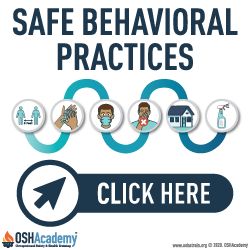Maintain Safe Behavioral Practices
We have all had to make significant behavioral changes to reduce the spread of COVID-19. These changes help prevent transmission of other infectious diseases, such as influenza. To stay healthy after an extended closure, everyone should continue these practices:
- social distancing (specifically, staying 6 feet away from others when you must go into a shared space)
- frequently washing hands or use alcohol-based (at least 60% alcohol) hand sanitizer when soap and water are not available - you should also place have hand sanitizer available at entry doors and other areas around the workplace
- wearing cloth face coverings
- avoiding touching eyes, nose, and mouth
- staying home when sick
- cleaning and disinfecting frequently touched objects and surfaces
It's important to continue to follow federal, state, tribal, territorial, and local guidance when reopening from an extended closure due to an infectious outbreak. Check this resource for recent updates on COVID-19. This will help you change your plan when situations are updated.
Consider Practices that Reduce Exposure
It is also essential to change the ways we use public spaces to work, live, and play. We should continue thinking about our safety and the safety of others.
To reduce the risk of spreading influenza or COVID-19, consider whether you need to touch certain surfaces or materials. Consider wiping public surfaces before and after you touch them.
Another way to reduce the risk of exposure to an infectious disease is to make long-term changes to practices and procedures:
- reducing the use of porous materials used for seating
- leaving some doors open to reduce touching by multiple people
- opening windows to improve ventilation
- removing objects in your common areas, like coffee creamer containers
You can take additional steps to identify and implement safety work practices to help reduce the spread of illnesses and protect your staff and the public.
Knowledge Check Choose the best answer for the question.
1-8. What long-term changes to practices and procedures can help reduce the spread of exposure to coronaviruses?
You forgot to answer the question!

